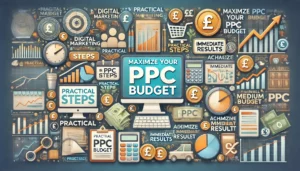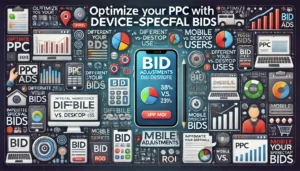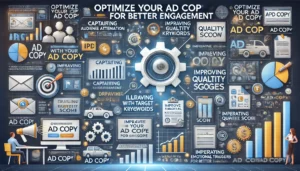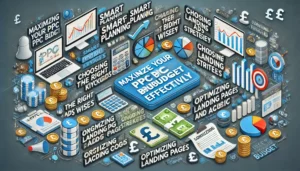Maximising Your PPC Budget: Actionable Techniques for Immediate Results

Managing a PPC budget can be tricky, especially for small and medium businesses. However, with the right techniques, you can get the most out of every pound spent. This article will guide you through practical steps to maximise your PPC budget and achieve immediate results.
Key Takeaways
- Assess your current PPC spend to understand where your money is going.
- Set realistic goals to ensure your PPC campaigns are aligned with your business objectives.
- Use keyword research to find the most effective keywords for your ads.
- Implement bidding strategies that can save money and improve ad performance.
- Optimise landing pages to ensure they convert visitors into customers.
Understanding Your PPC Budget
Assessing Your Current Spend
To make the most of your PPC budget, start by evaluating your current spending. Analyse your existing campaigns to see where your money is going and identify areas of waste. Use tools like Google Ads PPC reports to get a clear picture of your expenditures. This will help you understand which campaigns are performing well and which ones need adjustment.
Setting Realistic Goals
Setting achievable goals is crucial for effective PPC management. Define what success looks like for your business, whether it’s increasing brand awareness, generating leads, or driving sales. Make sure your goals are specific, measurable, attainable, relevant, and time-bound (SMART). This will help you allocate your budget more effectively and measure your progress.
Allocating Funds Effectively
Once you have a clear understanding of your current spend and goals, it’s time to allocate your funds. Prioritise campaigns that align with your business objectives and have shown good performance. Consider working with a PPC agency or a London PPC agency to get expert advice on fund allocation. They can help you make data-driven decisions and optimise your budget for better results.
Efficiently allocating your PPC budget ensures that every pound spent contributes towards achieving your marketing objectives with maximum impact.
By following these steps, you can ensure that your PPC budget is used wisely, maximising your return on investment and driving your business forward.
Maximising Your PPC Budget with Keywords
Choosing the right keywords is the backbone of effective PPC optimisation. The goal is to identify the terms and phrases that potential customers use when searching for products or services like yours. This involves thorough research, using tools like Google’s Keyword Planner, to find high-volume keywords that are relevant to your business.
Bidding Strategies That Save
Manual vs. Automated Bidding
Choosing between manual and automated bidding can significantly impact your PPC budget. Manual bidding gives you full control over each keyword bid, allowing for precise adjustments. However, it can be time-consuming. On the other hand, automated bidding uses algorithms to adjust bids in real-time based on performance data. Automated bidding can save time and optimise your budget efficiently. Consider starting with automated bidding if you’re new to PPC, and gradually move to manual bidding as you gain more experience.
Bid Adjustments for Different Devices
Not all devices perform equally when it comes to PPC ads. You might find that mobile users convert better than desktop users, or vice versa. Implementing bid adjustments for different devices allows you to allocate your budget where it’s most effective. For example, you can increase bids for mobile devices if they show higher conversion rates. This strategy ensures that your budget is spent wisely, maximising your return on investment.
Seasonal Bid Strategies
Seasonal trends can greatly affect the performance of your PPC campaigns. During peak seasons, such as holidays or special events, competition can be fierce, driving up bid prices. To navigate this, adjust your bids according to seasonal demand. Increase your bids during high-demand periods to capture more traffic, and lower them during off-peak times to save money. This approach helps you stay competitive while managing your budget effectively.
By understanding and implementing these bidding strategies, you can make the most out of your PPC budget, ensuring every pound is well spent.
Ad Scheduling and Geo-Targeting
Optimal Ad Scheduling
Ad scheduling can significantly boost your click-through rates. By displaying ads during peak days and hours, you ensure that your ads are seen when potential customers are most likely to search for your products. This approach not only optimises your ad budget but also leads to increased engagement and higher click-through rates.
Geo-Targeting Best Practices
When your business operates in specific geographic locations, using geo-targeting is essential. This ensures you don’t waste funds on clicks from users outside your service area. Targeting ads to specific geographic areas can help you reach the right audience more effectively.
Combining Scheduling and Geo-Targeting
Combining ad scheduling with geo-targeting can further enhance your ad performance. By showing ads at optimal times and in the right locations, you can maximise your budget and achieve better results. This strategy is particularly useful for businesses with a local presence or those targeting specific regions.
Leveraging these techniques can help you get the most out of your Google advertising agencies, ensuring your ads reach the right people at the right time.
Landing Page Optimisation
Designing for Conversions
Optimising your landing page is crucial because it’s where conversions happen after a user clicks on your ad. The design should be clear and cohesive, aligning with your ad copy to ensure a seamless experience. A well-designed landing page can significantly boost your conversion rates. Make sure your call-to-action (CTA) is prominent and easy to find. Use compelling headlines and concise text to keep visitors engaged.
A/B Testing Landing Pages
A/B testing is a powerful way to determine what works best on your landing page. By testing different elements like headlines, images, and CTAs, you can identify what drives the most conversions. Start with one element at a time to see its impact. Continuous testing and tweaking can lead to significant improvements in performance.
Reducing Bounce Rates
High bounce rates can be a sign that your landing page isn’t meeting visitors’ expectations. To reduce bounce rates, ensure your page loads quickly and is mobile-friendly. Use engaging content that matches the intent of your ad. Bullet points and short paragraphs can make your content more digestible. Remember, the goal is to keep visitors on your page and guide them towards conversion.
Consistent monitoring and adjustments are key to maintaining an effective landing page. Always be ready to make changes based on data and user feedback.
Ad Extensions and Ad Copy
Ad extensions are extra pieces of information or call-to-action buttons that you can add to your online ads. They provide more context and encourage user engagement. Focus on adding value and relevance, such as quick links to specific products via site links or showcasing unique selling points with callout extensions.
Effective Use of Ad Extensions
Using ad extensions like sitelinks, callouts, and structured snippets can enhance your ads’ visibility and provide additional information. This can lead to better click-through rates and conversions. For example, sitelinks can direct users to specific pages on your website, while callout extensions can highlight special offers or unique features.
Crafting Compelling Ad Copy
Optimising your ad copy is crucial for capturing the audience’s attention and driving engagement. Use clear, compelling messages that are closely aligned with your target keywords. A well-crafted ad copy can significantly improve your Quality Score, leading to lower costs and better ad placements. Consider integrating emotional triggers and clear calls-to-action (CTAs) to enhance the effectiveness of your ad copy.
Testing Different Ad Variations
A/B testing is a key strategy in optimising your ad copy. By testing different versions of your ads, you can identify which elements resonate most with your audience. This data-driven approach allows you to make informed decisions and continuously improve your ad performance. Remember, even small changes can lead to significant improvements in your campaign results.
Regularly conducting a Google ads audit can help you identify areas for improvement and ensure your campaigns are running efficiently. This is especially important for Google ads agencies looking to maximise their clients’ budgets.
Conversion Tracking and Analytics
Setting Up Conversion Tracking
Conversion tracking is essential for understanding the customer journey and identifying which touchpoints drive the most conversions. For instance, if you see a high number of conversions after users interact with your remarketing ads, you can allocate more budget to those campaigns to boost your ROI. Setting up conversion tracking involves adding tracking codes to your website to monitor actions like form submissions, purchases, or sign-ups. This data helps you attribute revenue directly to your PPC efforts.
Analysing PPC Performance
Continuous monitoring and analysis of your campaign performance allow for real-time adjustments, ensuring your campaigns stay effective and efficient. Use tools like Google Analytics to track key metrics such as click-through rates (CTR), conversion rates, and cost per acquisition (CPA). By analysing these metrics, you can identify underperforming ads, ad groups, or keywords and make necessary adjustments to improve your campaign’s performance.
Using Analytics for Continuous Improvement
To maximise your PPC budget, it’s crucial to use analytics for ongoing improvement. Test different ad variations by changing headlines, descriptions, and calls to action to see which combinations resonate most with your audience. By continuously optimising your ad copy, you can increase your CTR and drive more qualified traffic to your site. Regularly reviewing your analytics data helps you make informed decisions and refine your strategies for better results.
A/B Testing for Budget Optimisation
Creating A/B Test Plans
A/B testing, also known as split testing, is essential for understanding what works best in your PPC campaigns. Start by allocating a portion of your budget specifically for testing. A good rule of thumb is to set aside 10-20% of your total PPC budget for these efforts. This allows you to experiment without risking your main budget. Create variations of your ad copy, headlines, images, and calls-to-action (CTAs). Test these elements to see which combinations yield the highest conversion rates.
Interpreting Test Results
Once your tests are running, it’s crucial to analyse the data effectively. Look for statistically significant results to determine which variations perform best. Use performance data from past campaigns to guide your decisions. Focus on elements that have historically driven higher engagement. Remember, the goal is to find the most effective combination of elements that resonate with your audience.
Implementing Changes Based on Data
After identifying the winning variations, implement these changes across your campaigns. This step ensures that your budget is being used efficiently. Regularly update your A/B test plans to include new elements and continue optimising. By continuously refining your approach based on data, you can maximise your PPC budget and achieve better ROI over time.
Consistent A/B testing and optimisation are key to staying ahead of the competition and ensuring your PPC campaigns are as effective as possible.
Conclusion on Maximising Your PPC Budget
In conclusion, making the most of your PPC budget is all about smart planning and ongoing tweaks. By understanding your budget, choosing the right keywords, and using effective bidding strategies, you can see quick improvements. Don’t forget to schedule your ads wisely and target the right locations. Optimising your landing pages and ad copy can also make a big difference. Keep an eye on your results with conversion tracking and analytics, and always be ready to test new ideas. With these steps, even small businesses can achieve great results from their PPC campaigns.
Frequently Asked Questions
What is PPC and why should I use it?
PPC stands for Pay-Per-Click. It’s an online advertising model where you pay each time someone clicks on your ad. It’s a great way to drive traffic to your site quickly and can be very cost-effective if managed well.
How do I determine my PPC budget?
First, look at how much you’re currently spending and what results you’re getting. Then, set clear goals for what you want to achieve with your PPC campaign. Allocate your funds based on these goals and your overall marketing budget.
What are long-tail keywords and why are they important?
Long-tail keywords are longer and more specific keyword phrases. They are important because they often have less competition and can attract more targeted traffic, which can lead to higher conversion rates.
How can I improve my ad copy?
To improve your ad copy, make sure it is clear and compelling. Highlight the benefits of your product or service and include a strong call-to-action. Testing different versions of your ad copy can also help you see what works best.
What is A/B testing and how does it help?
A/B testing is a method where you compare two versions of an ad or landing page to see which one performs better. It helps you make data-driven decisions and optimise your PPC campaigns for better results.
Why is conversion tracking important in PPC?
Conversion tracking lets you see what happens after a user clicks on your ad. It helps you measure the effectiveness of your PPC campaigns and understand which ads are driving the most valuable actions, like sales or sign-ups.
Author
Search Blog
Free PPC Audit
Subscribe to our Newsletter
The Voices of Our Success: Your Words, Our Pride
Don't just take our word for it. With over 100+ five-star reviews, we let our work-and our satisfied clients-speak for us.
"We have been working with PPC Geeks for around 6 months and have found Mark and the team to be very impressive. Having worked with a few companies in this and similar sectors, I rate PPC Geeks as the strongest I have come across. They have taken time to understand our business, our market and competitors and supported us to devise a strategy to generate business. I value the expertise Mark and his team provide and trust them to make the best recommendations for the long-term."
~ Just Go, Alasdair Anderson




